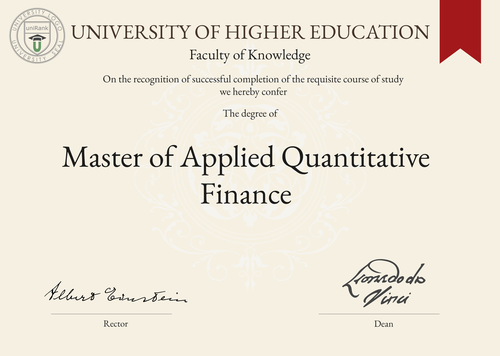
Master of Applied Quantitative Finance (MAQF)
Guide to Master of Applied Quantitative Finance Program/Course/Degree
Master of Applied Quantitative Finance (MAQF)

Program Name
Master of Applied Quantitative FinanceProgram or Degree abbreviation
MAQFDuration range
The duration of the program typically ranges from 1 to 2 years.Tuition range
The tuition fees for the program can vary depending on the chosen country or university. It is recommended to check with specific institutions for accurate information.Overview
The Master of Applied Quantitative Finance program is designed to provide students with advanced knowledge and skills in quantitative finance. It combines theoretical foundations with practical applications to prepare graduates for careers in the finance industry.Curriculum Overview by year
The curriculum is structured to cover a wide range of topics in quantitative finance. The following is a general overview of the program's curriculum by year: Year 1: - Financial Mathematics - Financial Econometrics - Derivative Securities - Risk Management - Portfolio Management Year 2: - Advanced Topics in Quantitative Finance - Financial Modeling - Algorithmic Trading - Fixed Income Securities - Elective CoursesKey Components
The key components of the program include: - Strong foundation in mathematical and statistical concepts - Application of quantitative methods in finance - Understanding of financial markets and instruments - Risk management and portfolio optimization techniques - Practical experience through projects and internshipsCareer Prospects
Graduates of the Master of Applied Quantitative Finance program have excellent career prospects in various sectors of the finance industry. They can pursue roles such as quantitative analysts, risk managers, financial consultants, portfolio managers and research analysts.Salary Expectations
The salary expectations for graduates of the program can vary depending on factors such as location, industry and level of experience. Generally, professionals in the field of quantitative finance earn competitive salaries. For a more accurate understanding of salary expectations, you can utilize the Job Sites Search Engine, from our sister site jobRank, which searches over 4,600 job sites worldwide. Make sure to specify not only the job title but also the country you are interested in.Conclusions:
It is important to note that the duration, tuition fees, curriculum, key components, career prospects and salary expectations of the Master of Applied Quantitative Finance program can vary depending on the chosen country or location of study, as well as the specific university offering the program. Prospective students are advised to research and compare different options to find the program that best suits their needs and goals. Furthermore, visitors interested in pursuing this specific degree (MAQF) can utilize the uniRank World Universities Search Engine to search for institutions offering the program anywhere in the world. This search engine provides a comprehensive database of universities and their respective programs, making it easier for individuals to find the right educational institution for their desired degree.World Universities Search Engine
search for Master of Applied Quantitative Finance (MAQF) and add the Location (country, state etc.) or specific University you are interested in studying at.
Query examples:
- Master of Applied Quantitative Finance (MAQF) United States
- Master of Applied Quantitative Finance (MAQF) United Kingdom online
- Master of Applied Quantitative Finance (MAQF) Australia international students
- Master of Applied Quantitative Finance (MAQF) University of California
- Master of Applied Quantitative Finance (MAQF) University of London tuition fees
- Master of Applied Quantitative Finance (MAQF) University of Sydney scholarships
Share Program/Course
Interesting? Share this program/course/degree info with your friends now.